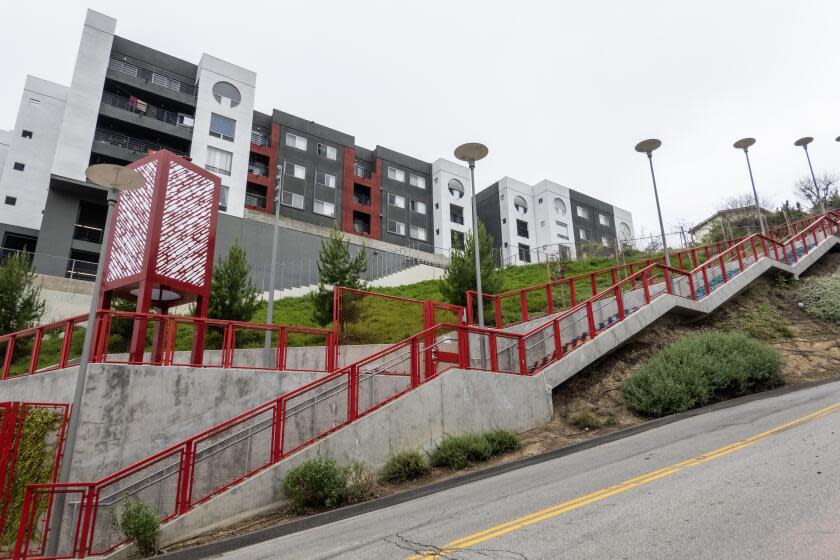L.A. council member to seek more money to help tenants in Chinatown apartment building

The Los Angeles City Council voted Friday to spend nearly $15 million to spare many tenants of a Chinatown apartment building from major rent hikes, even as several of those residents demanded the city do more to erase their unpaid back rent.
On a 14-0 vote, the council agreed to use city funds to limit rent increases for the next 10 years at the Hillside Villa Apartments, where residents have been in a battle with their landlord since 2019, when previous restrictions on the building's rents expired.
The agreement approved Friday would roll back rent hikes in many of Hillside Villa's units. In addition, tenants with unpaid back rent would avoid eviction proceedings by signing an agreement promising to gradually repay the landlord over the next six years at 3% interest, according to the city's report.
Tenant advocates and some residents of Hillside Villa denounced the deal, saying many cannot afford to pay. Residents in 48 of the building's 124 units still owe a combined $1.4 million in back rent, according to Ann Sewill, who heads the city's Housing Department.
For years, a major portion of the building's tenants have participated in a rent strike, withholding payments in an effort to counter steep rent increases.
Some of those debts were erased in recent years by city and state COVID-19 relief funds. The tenant advocates said more help is needed.
Appearing before the council, one speaker said the repayment requirement would be a "death sentence" for the building's low-income residents. Another called the agreement a "slap in the face."
"We're really, really dissatisfied with this deal," said Rosasela Hernandez, a 17-year Hillside Villa resident. "We're still at risk of being evicted."
Read more: L.A. cuts tentative deal to provide $15 million to spare Chinatown tenants from steep rent hikes
Councilmember Eunisses Hernandez, whose district includes Chinatown, said this week that she had persuaded the owner to delay the start of the six-year repayment period by six months. She said she also intends to use $250,000 of her office's discretionary funds to erase the first year of unpaid rent debt at Hillside Villa, a move that could delay the start of the repayment process until late 2025.
Hernandez said she is looking for other funding sources to cover the remaining back rent.
"We're going to look under every rock and every opportunity and every pathway to try to find the resources to close that gap," she said. "That's inside this building, that's outside of this building."
Thomas Botz, managing member of 636 NHP, the company that owns the building, said the unpaid rent ranges from less than $5,000 for some households to nearly $91,000. After Friday's vote, Botz praised the council member for working to find a resolution.
"I admire that she stands up for the tenants and is trying to be there for them," he said. "She really went to bat for them."
Housing officials reported last week that they had struck a deal with Botz to use city money to roll back rent for many Hillside Villa tenants to 2019 rates.
Hillside Villa had served for 30 years as affordable housing as part of an agreement with city officials. Those rent restrictions expired five years ago, prompting Botz to increase rents, in some cases doubling or tripling the amount.
Tenant activists responded by urging the council to purchase Hillside Villa using eminent domain, a process used by government agencies to acquire private property. Protesters went to city officials' homes to demand they force a sale. In 2022, the council voted to begin an effort to purchase the building.
Sewill, whose home was picketed multiple times, eventually came out against that idea, saying the cost of acquiring the property from an unwilling seller, then fixing and refinancing it, would reach nearly $93 million, or $748,665 per unit.
Not every household in Hillside Villa will get city assistance. Seventeen of the building's units are occupied by residents who are paying market rate. An additional 68 units already have been subsidized by Section 8 rental vouchers — although some of those tenants have also withheld rent, Botz said.
As part of the deal, Botz will have an additional 10 years to repay a $3.5-million redevelopment loan at 1% interest. A second, $1.85-million loan will eventually be forgiven, as long as the landlord adheres to the terms of his agreement with the city, housing officials said.
This story originally appeared in Los Angeles Times.


